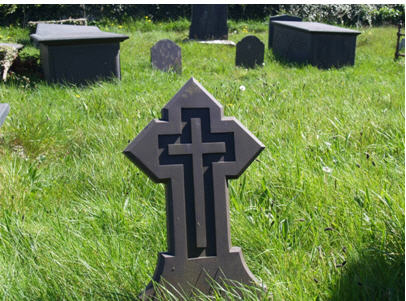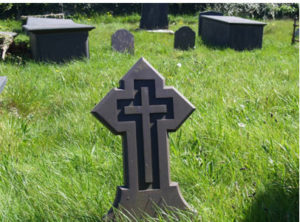A Saint’s Closing Prayer
Podcast: Play in new window | Download
Subscribe: RSS
TITLE: A Saint’s Closing Prayer
INTRODUCTION:
1. Read: Psalm 90
2. About the Text:
1) The headings to these Psalms are very old.
2) On this Psalm we read, “A prayer of Moses, the man of God.”
3) Moses was acknowledged by God as being a meek man.
4) No doubt, his life was characterized by prayer.
5) This prayer appears to have been composed during the wilderness wanderings, perhaps toward the end of those wanderings.
6) Keil and Delitsch point out in their commentary similarities between this Psalm and the book of Deuteronomy.
7) This prayer of Moses appears to be a closing prayer; a prayer uttered, perhaps, at a funeral or at the end of a service, or, perhaps, in this case, toward the end of the period of wanderings.
8) One could imagine Moses uttering this prayer at the funeral of Aaron or Miriam or even prior to his departure from the people to go up to mount Pisgah.
9) It serves as a model closing prayer for us today whether we are dismissing a service or conducting a funeral.
10) In fact, many gospel preachers have used this text for a funeral service.
3. Ref. to S, T, P, O, and A.
DISCUSSION: A saint’s closing prayer is a prayer . . .
I. Of Benediction to the LORD (verses 1-2).
1. The word “benediction” literally means to speak well of someone.
2. Here, Moses is speaking well of the LORD, Adonai.
1) As the dwelling place of His people.
2) As the one who exists.
3. Verse 1 teaches us . . .
1) A Fact – God’s people have a dwelling place.
2) A Place – The dwelling place for God’s people is in the Lord.
3) A Time – in all generations.
4. We learn that the Lord is the ultimate sanctuary for God’s people.
1) He is sanctuary when we’re persecuted. 1 Peter 4:19 “Wherefore let them also that suffer according to the will of God commit their souls in well-doing unto a faithful Creator.”
2) He is sanctuary when hard decisions must be made in our lives. Proverbs 3:5-6 says, “Trust in the LORD with all thine heart; and lean not unto thine own understanding. In all thy ways acknowledge him, and he shall direct thy paths.”
3) He is sanctuary even when we have sinned. Psalm 51:9-11 “Hide thy face from my sins, and blot out all mine iniquities. Create in me a clean heart, O God; and renew a right spirit within me. Cast me not away from thy presence; and take not thy holy spirit from me.”
4) Psalm 84:11 “For the LORD God is a sun and shield: the LORD will give grace and glory: no good thing will he withhold from them that walk uprightly.”
5. We learn from verse 2 that this sanctuary is secure because God is preexistent to . . .
1) The mountains.
2) The earth/world.
3) To time itself.
6. When we pray to God, we ought to begin with words of blessing.
7. What a great benediction to speak concerning God!
II. Respecting the Brevity of Life (verses 3-11)
1. In this section we learn the brevity of life.
1) Verse 4 teaches that God isn’t limited by time.
2) Verses 5-6, and 10 teaches us that by comparison man’s days are limited.
3) This reminds us of what James has to say about the brevity of life.
4) James 4:13-15 “Go to now, ye that say, To day or to morrow we will go into such a city, and continue there a year, and buy and sell, and get gain: Whereas ye know not what shall be on the morrow. For what is your life? It is even a vapour, that appeareth for a little time, and then vanisheth away. For that ye ought to say, If the Lord will, we shall live, and do this, or that.”
2. Moses also acknowledges the relationship of man’s sin to death.
1) Verses 3, 7-9, and 11.
2) In essence, Moses sees death as the expression of God’s anger for sin.
3) Brother Taylor suggests the Psalm may have been written after Kadesh-Barnea.
4) We recall Moses situation. Numbers 26:25 “For the LORD had said of them, They shall surely die in the wilderness. And there was not left a man of them, save Caleb the son of Jephunneh, and Joshua the son of Nun.”
5) While we’ve not been condemned to die in a physical wilderness as the Israelites, we find their situation instructive to us by virtue of their typical relationship to us today.
6) The earth is our wilderness and we, by virtue of man’s sin, must suffer the consequence of physical death.
7) Romans 5:12 says, “Wherefore, as by one man sin entered into the world, and death by sin; and so death passed upon all men, for that all have sinned.”
8) We ought not to conclude from this Psalm that God is specifically angry with his saints who die for Psalm 116:15 states, “Precious in the sight of the LORD is the death of his saints.”
9) Rather, we conclude that death is the expression of God’s anger with sin in general and that is what is being expressed in this Psalm.
10) Our closing prayers should acknowledge the brevity of life.
III. In Bequest (as a legacy) to the Living (verses 12-17).
1. A Lesson to Learn (verse 12).
1) Teach us to number our days.
a. Recognition of Brevity of our days – Psalm 39:4-5 “O LORD, make me know my end and what is the measure of my days; let me know how fleeting I am! Behold, you have made my days a few handbreadths, and my lifetime is as nothing before you. Surely all mankind stands as a mere breath!” (ESV)
b. Recognition of Value of our days – Ephesians 5:15-17 “See then that ye walk circumspectly, not as fools, but as wise, Redeeming the time, because the days are evil. Wherefore be ye not unwise, but understanding what the will of the Lord is.”
c. To get a heart of wisdom so that we can best use the days we have. Proverbs 3:13-18 “Happy is the man that findeth wisdom, and the man that getteth understanding. For the merchandise of it is better than the merchandise of silver, and the gain thereof than fine gold. She is more precious than rubies: and all the things thou canst desire are not to be compared unto her. Length of days is in her right hand; and in her left hand riches and honour. Her ways are ways of pleasantness, and all her paths are peace. She is a tree of life to them that lay hold upon her: and happy is every one that retaineth her.”
2. A Lord to Love (verses 13-14)
1) A request to return – He knows the love of God and warts the Lord to return.
2) Have pity – Psalm 103:8-18 read.
3) Satisfy with your love – ESV here reads “Satisfy us in the morning with your steadfast love.”
4) For the sake of joy – God wants us to be happy. Philippians 4:4 “Rejoice in the Lord alway: and again I say, Rejoice.”
3. A Life to Live (verses 15-17)
1) A Happy life – John 16:20 “Verily, verily, I say unto you, That ye shall weep and lament, but the world shall rejoice: and ye shall be sorrowful, but your sorrow shall be turned into joy.”
2) A Learning life –Psalm 77:12 “I will meditate also of all thy work, and talk of thy doings.”
3) A Stable life – Proverbs 4:25-27 In reference to the advice of a father. “Let thine eyes look right on, and let thine eyelids look straight before thee.Ponder the path of thy feet, and let all thy ways be established. Turn not to the right hand nor to the left: remove thy foot from evil.”
4. Our closing prayer should be uttered in bequest to the living.
CONCLUSION:
1. What a wonderful example we have in this Psalm of a saint’s closing prayer. It is a prayer…
1) Of Benediction to the Lord.
2) Respecting the Brevity of Life
3) In Bequest to the Living
2. Invitation


